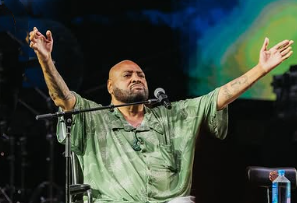George “Fiji” Veikoso, a unique individual whose voice became a national identity and whose health issues were publicly lived in front of fans, personified both triumph and struggle. He was more than just a singer; he was a living link between the past and the present, embodying Fiji’s cultural pulse as his body struggled with ever-increasing challenges.
George was born in Tailevu in 1970 and spent his childhood singing hymns in church, where his gift was recognized before he realized its full potential. His journey completely changed in 1987 when he departed for Hawaii amidst political turmoil. It was there that his music flourished. His 1994 debut album Evolution, which combined soulful R&B, roots reggae, and distinctly Pacific harmonies, signaled the start of a career that would span decades and oceans.
Biography & Career Table
| Category | Details |
|---|---|
| Full Name | George Brooks Veikoso |
| Stage Name | Fiji |
| Date of Birth | May 10, 1970 |
| Place of Birth | Tailevu, Fiji |
| Date of Passing | 2025, Suva, Fiji (aged 55) |
| Major Albums | Evolution (1994), Born & Raised, Love & Roots |
| Signature Songs | “Sweet Darlin’,” “Lia,” “Symphony of Love” |
| Career Highlights | Na Hoku Hanohano Awards, Best Pacific International Artist (2014), Lifetime Achievement Award (2021) |
| Cultural Impact | Blended Pacific chants, vude, vanua identity with reggae, R&B, and jazz |
| Reference |
His songs, such as “Sweetheart Darlin’,” “Lia,” and “Symphony of Love,” became remarkably reminiscent of family heirlooms and were played during both happy and sad times. His voice served as an anchor for innumerable Pacific homes as listeners frequently recalled dancing to his music at weddings or turning to his lyrics on lonely evenings.
However, Fiji’s health problems revealed a different, agonizing, and incredibly human tale. Even though his body was clearly weaker, he was still able to fill arenas with sound with his voice in recent years while performing from a wheelchair. He didn’t withdraw into quiet. Rather, he allowed his admirers to witness both his strength and weakness, demonstrating that art does not require physical perfection but rather perseverance of spirit.
He made his first trip back to Fiji in decades at his 2024 Homecoming concert in Nadi. Thousands of people showed up to celebrate the man who returned to his roots as well as the music. The audience reported a deeper emotional resonance as they sat through his singing, as if each note had a hint of farewell and the weight of gratitude. The performance was especially creative in that it made vulnerability a component of the show’s power by using physical limitations as an emotional advantage.
Numerous musical careers have been altered by health issues. Tina Turner triumphed despite years of illness, and Elton John performed despite surgeries. Fiji is a fitting addition to this tradition of artists who serve as a reminder to the world that tenacity can be just as motivating as skill. His perseverance emphasized the point that sometimes the seated singer is the strongest person in the room and that you don’t always need to stand tall to get people to stand up.
Following his death, tributes portrayed a man whose impact was remarkably evident. He is “the biggest artist that ever came out of Fiji and the Pacific,” according to fellow artist Laisa Vulakoro. Fiji believed in him when he didn’t believe in himself, producer Damon Elliott wrote on the internet. Even though these statements are very personal, they also highlight the professional guidance that Fiji gave to up-and-coming artists throughout the region.
His health issues had an effect that extended beyond his personal narrative. His obvious difficulties brought attention to the need for urgent discussions in the Pacific, where healthcare systems are still underfunded. Fiji used his body as a form of advocacy by performing in public while obviously ill, reminding audiences that greater access to healthcare is a community need rather than a luxury. His tenacity turned into extremely effective activism without speeches—just by being there and not hiding.
Fiji’s legacy to the industry includes both his music and the opportunities he created. Despite playing minor roles, his appearances in Hollywood productions such as Baywatch and Blue Crush had a significant symbolic impact for Pacific pride. He is frequently credited by younger performers with inspiring them to dream of performing on stages outside of their borders. This crossover visibility significantly enhanced his journey by guaranteeing that Pacific voices were no longer marginalized.
Even at large concerts, fans remember the special intimacy he created. His health had severely limited his mobility by 2024, but audiences talked about how that in some ways made the performance more intimate. The concerts felt more like conversations than performances because the connection was sharper but the voice was softer.
In terms of society, Fiji’s tale relates to a more general reality regarding cultural icons. They serve as vehicles for identity in addition to being entertainers. His songs created something incredibly versatile that appealed to audiences with Pacific roots as well as those around the world by fusing chants, vude rhythms, and vanua themes into contemporary genres. In addition to being artistic, this fusion was political, demonstrating that Fiji’s identity could be shared and preserved.
His life continues to have an impact even after his death at the age of 55. He was dubbed “King” by the Kiwi reggae band Sons of Zion. On social media, fans referred to his voice as the background music for both their joys and their sorrows. For them, his music was incredibly resilient, enduring disease, transcending boundaries, and now existing beyond his passing.

